It's just a Matter of time

Welcome to the May edition of the Open Home Foundation newsletter, the place to learn about the latest and greatest things for your smart home that improve its privacy, choice, and sustainability.
The Open Home newsletter is written by Paulus Schoutsen - President of the Open Home Foundation, and founder of Home Assistant. Was this email forwarded to you? Subscribe here!
This month, we delve into Matter's slow progress and how that might not be a bad thing. We're also going through the latest news, including Home Assistant's updated roadmap, AI developments from big tech, our recent deprecation, and more.
Open Standards take time
If you have been following the saga that is Matter, you might have seen stories about glitching devices or some reviews giving a mixed reception to its current state. I’m especially guilty of tempering expectations about Matter's current state, just take my last appearance on the Vergecast (I may have used the term shitshow to describe some things, but I was also very optimistic about the future). I’ll say it again: Matter is still a work in progress, but that’s okay.
Though it may seem like the media and industry are being critical of the standard, it's tough love, and it's all meant to be constructive. Progress is steadily happening, and its future is looking very promising. When you compare it to other open smart home standards, Zigbee (announced in 2004) and Z-Wave (announced in 1999), at three years old, Matter is still in its infancy. Matter’s approach has been methodical, and there is a reason a standard has to develop like this — ultimately, its slow and steady approach is necessary.
As a new standard, it had to decide on everything. Luckily, it didn't have to invent everything. Apple, Amazon, and Google allowed some of their technology to be used as input. The Connectivity Standards Alliance (CSA), where Matter is developed, also makes Zigbee, which was also used as input. Another leg up Matter has on other standards is its separation of its application layer and networking layer. Compared to other standards that need to focus equally on developing a radio protocol along with everything else, Matter leverages existing communications technology like Wi-Fi and Thread.

The Matter software development kit (SDK) is open-source, allowing developers to contribute and build upon it. The source code is available on GitHub (ignore the differing name… it used to be called CHIP). There are hundreds of pull requests currently being worked on, some of which are from interested individuals and others are from big industry players. Other standards, such as Z-Wave, which are not currently open-source (for now, working on it!), are unable to benefit from the attention and resources that the open source community can provide.
This open way of working extends to the CSA members, who share ideas, learnings, and suggest new ways to bring the standard forward. Members include the biggest tech companies in the world (Apple, Google, Amazon), but also more modest organizations like Nabu Casa (the makers of Home Assistant Cloud 😉). These companies shape the Matter standard, suggestions are made, working groups are formed, decisions are considered, and if successful, the CSA adds them to the next standard version.
Each version sees new features, capabilities, bug fixes, and new device types. An early criticism of Matter was the lack of device types and missing capabilities. They have been slowly chipping away at a long list of device types while adding missing features to existing ones. Now the list is much longer, covering most common devices, and sometimes going into left-field, like the inclusion of microwaves and dishwashers. I particularly appreciated the focus on energy management added to Matter version 1.4, as it's one area where smart technology can make the biggest positive impact for the planet.
Currently, we’re on version 1.4.1, which added Enhanced Setup Flow (ESF) that allows for manufacturers to include terms and conditions (T&Cs) to be displayed and consented to during the commissioning process. This forgoes the need to open another app to reject your smart bulb's privacy policy. Which brings me to an essential part of a standards body like this: not all members have to agree with every decision. Every decision requires a certain amount of compromise, which can slow things down. However, these compromises are better than every brand having its own closed standard.
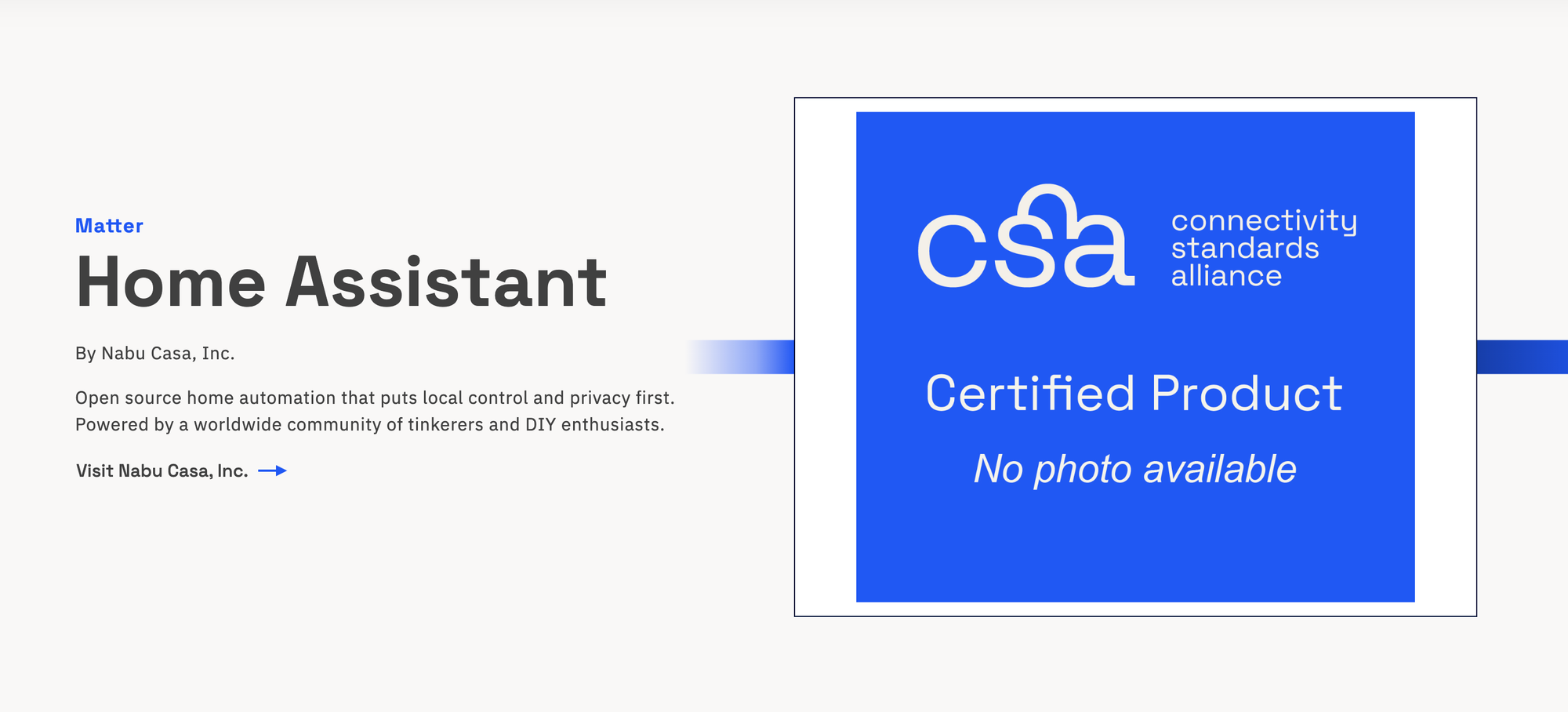
The standards body not only defines the standard, but also ensures that devices are interoperable. This allows consumers to buy any product, and in a perfect world, be able to use it with the hub of their choice. Matter even allows for multiple hubs to be used simultaneously to control the same devices. This again hits a small bone of contention, specifically that not every hub supports the latest version of Matter, thus some devices may have limited or no functionality with specific hubs. Luckily, there is a workaround; just install Home Assistant, as it is the most feature-rich, always at the forefront of Matter versions, and it is certified 😎.
The Open Home Foundation believes in open standards and actively participates in multiple. We are one of the few voices representing the open source community in these bodies. We’re also actively advocating in each standard for the Open Home values of privacy, choice, and sustainability. Open standards allow for more consumer choice, longer device support, reduced vendor lock-in, and promote local control, which is great for the Open Home.
This month in the news
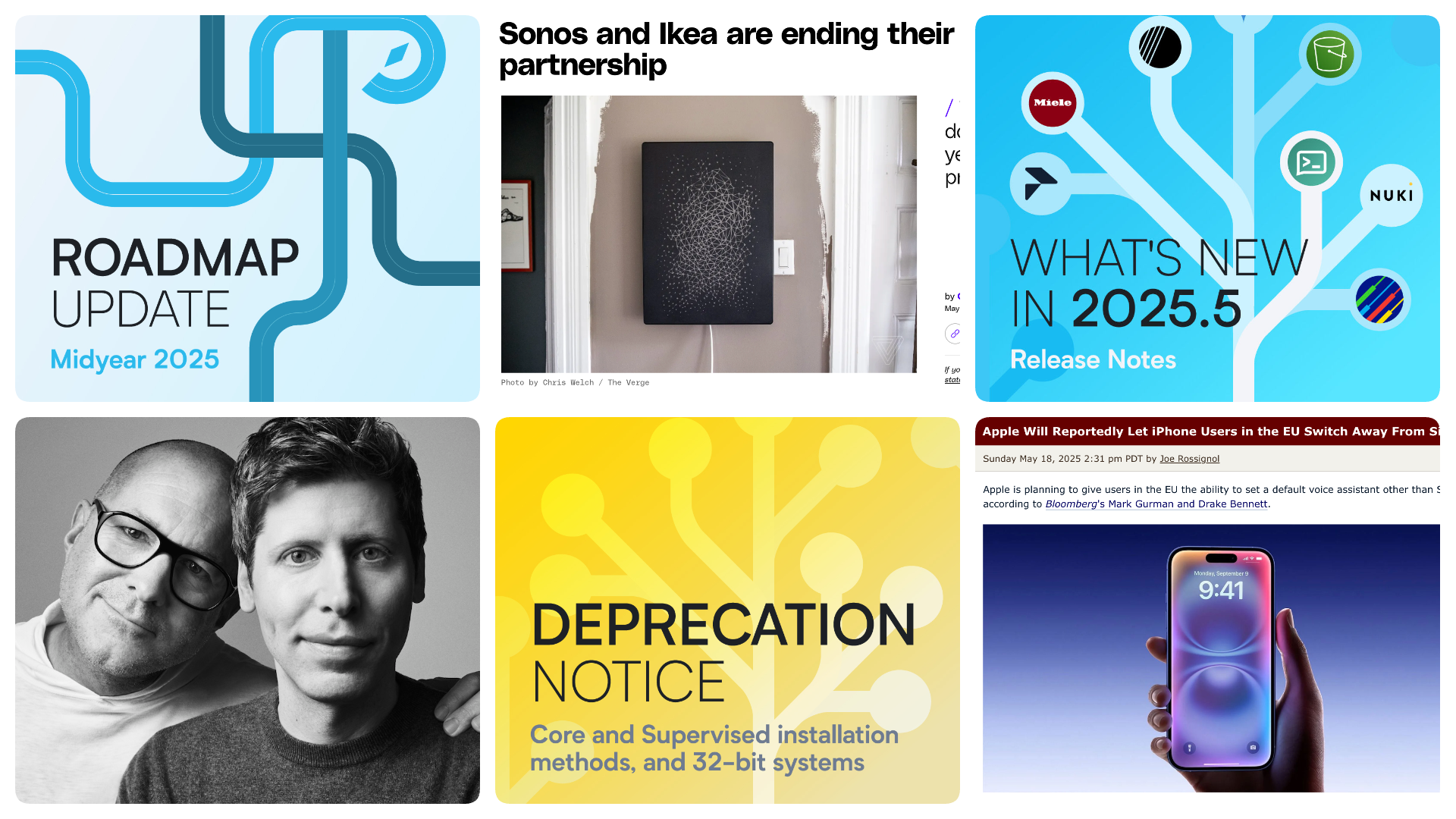
It's roadmap update time
Our 2025 Home Assistant roadmap update is here! We're making smart homes more intuitive, proactive, and user-friendly by improving device context understanding and launching a new community-powered Device Database.

We’re also prioritizing the advancement of automation, voice, dashboards, and more. Check out the full update to get all the details.
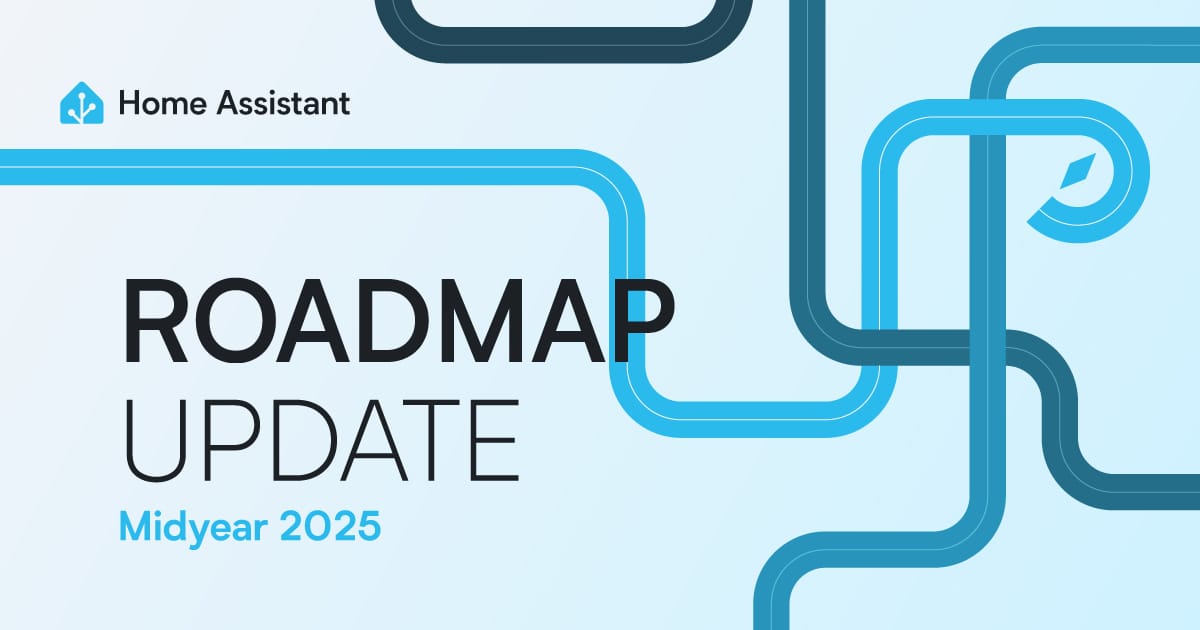
The AI assistants march on
It's been a couple of months since the announcement of Alexa+, and it's finally been spotted in the wild (Catus Maximus, YouTube). The internet seems underwhelmed, and I bet most won't be able to notice this is the new Alexa. It can answer basic questions, but it still struggles with context and remembering requests long term. Amazon CEO Andy Jassy says there are now 100,000 Alexa+ users (Maxwell Zeff, TechCrunch), maybe some of them aren't underwhelmed by it.
Amazon isn’t the only big tech pushing its AI into the home, as Google continues to slowly and more quietly incorporate Gemini into its Nest products. This time, they’re working it into the Google Home APIs (Jennifer Pattison Tuohy, Verge), a few companies are using it to make products “smarter,” like auto-starting a vacuum when you leave home. (side note: Home Assistant doesn’t require AI to do this).
While those are two interesting, differing approaches from Amazon and Google, let's check in with Apple… oh, never mind, internally their Siri team seems to be doing another reshuffle (Wes Davis, Verge). Their technique of making an advertisement about their AI capabilities and hoping their Siri team will just deliver it may have been the wrong approach (Snazzy Labs, YouTube). At least you might be able to replace Siri in the EU with the assistant of your choice in future (Joe Rossignol, Mac Rumors). We’d all prefer an Assist-powered phone over Siri.
Move over Apple, it's time for an actual third player in the AI assistant race, and they know how to build unnecessary hype. OpenAI paid billions to work with Jony Ive (Mark Gurman, Bloomberg), and together they're going to deliver some hardware, someday 😵💫.
Deprecation notice for Home Assistant

To move forward, sometimes you need to make some pretty difficult decisions. The Home Assistant team recently made the decision to deprecate support for some advanced installation methods (Core and Supervised) and legacy 32-bit CPU architectures. These decisions will only affect a small percentage of users, but that's never the reason we do anything. It was the support burden they presented — with complex install methods came complex issues, with equally complex solutions for our community-led support teams.
We'll provide six more months of support for these systems and after that point, they'll become unsupported. Read the blog to find out if you're impacted and how to migrate.
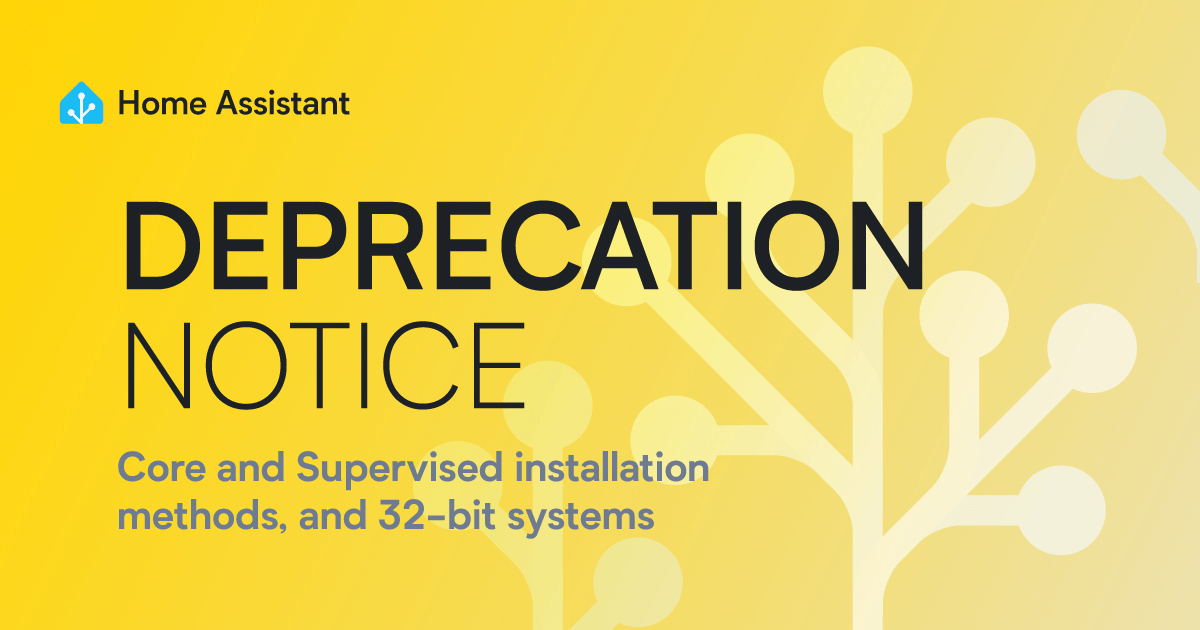
Sonos being Sonos
Another month, another disappointing story about Sonos. They’re ending their relationship with Ikea (Parker Hall, Wired). Act fast to snap up some of the most interesting and affordable entries in the Sonos line, well, if you're fine with using their notorious app. That app is apparently much better now, according to their interim CEO Tom Conrad (Chris Welch, Verge). In this conversation with The Verge, he called Sonos "the third compute platform" 🤦♂️, but at least he swore off any app paywalls. However, we’d still recommend ditching their app, where you can, for Music Assistant.
Home Assistant 2025.5
Home Assistant's May release was packed! More improvements to backups, cooler voices for your assistants, a better entity picker interface, and Z-Wave Long Range support.
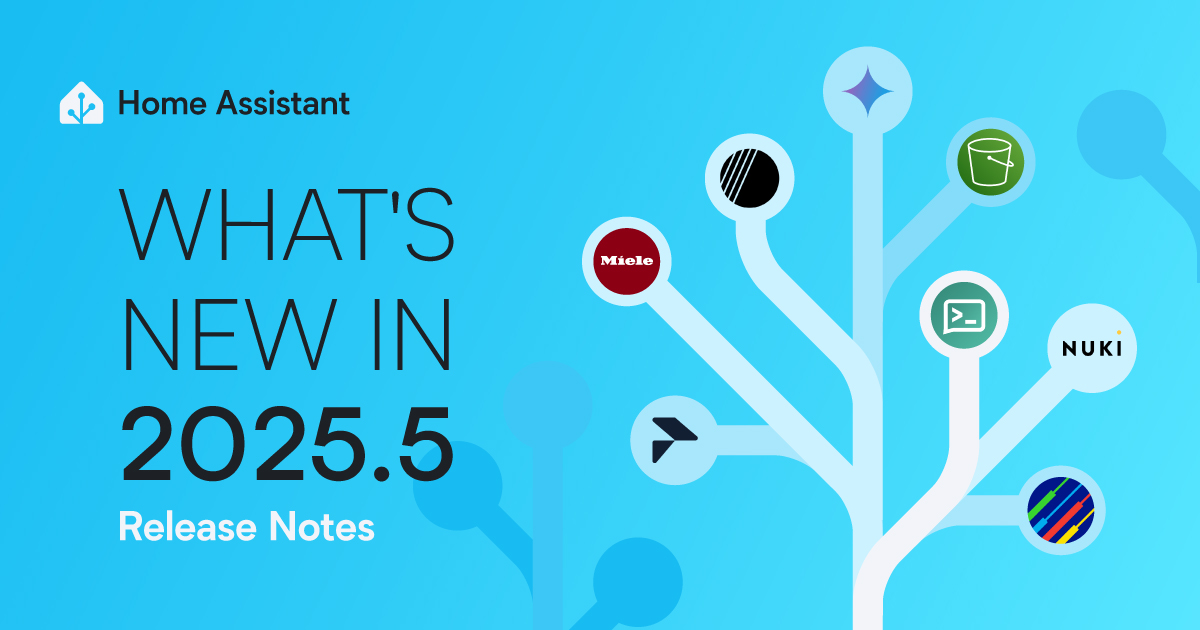
FYI, for this month only, we're changing up the beta schedule, meaning the beta for 2025.6 will happen a week earlier than usual (which is now).
Community highlights
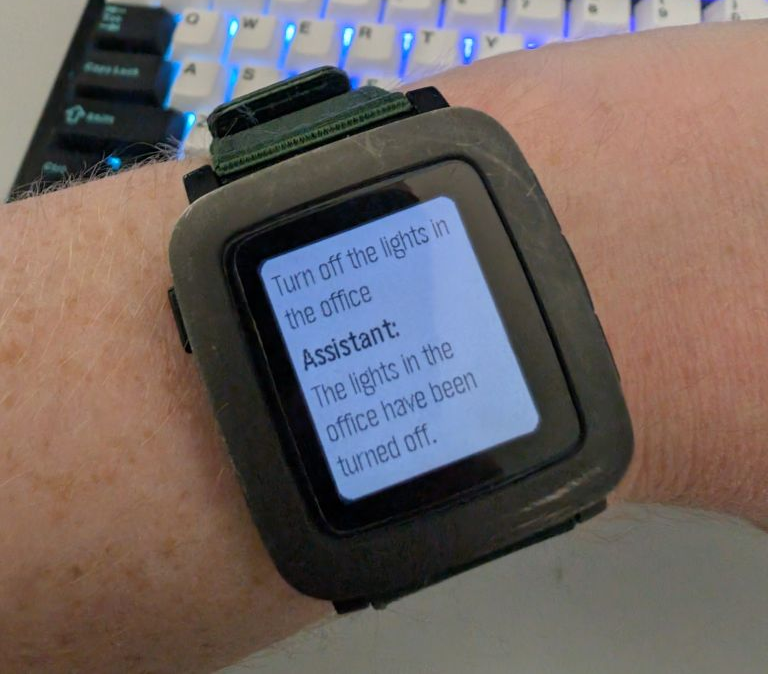
Skylord123 made a Pebble app for Home Assistant, a watch that has been out of production for a decade. Perfect timing for the new Pebble watches coming out soon.
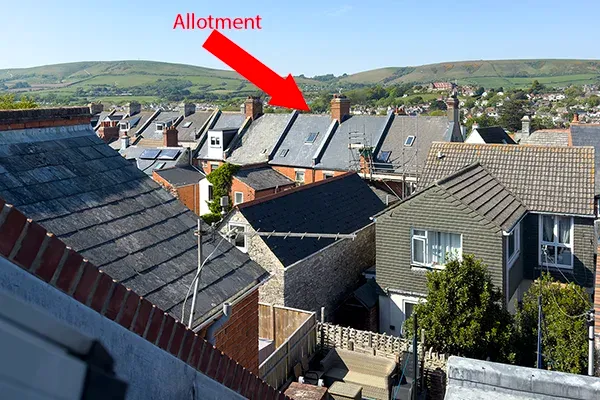
Brian Dorey has connected their allotment over half a mile away to their smart home using LoRa. It has multiple sensors, automates watering, is solar-powered, and was made on a budget.

u/Bournerx has created and refined a status card that quickly shows everything happening in your home. It's a great way to get a quick overview.
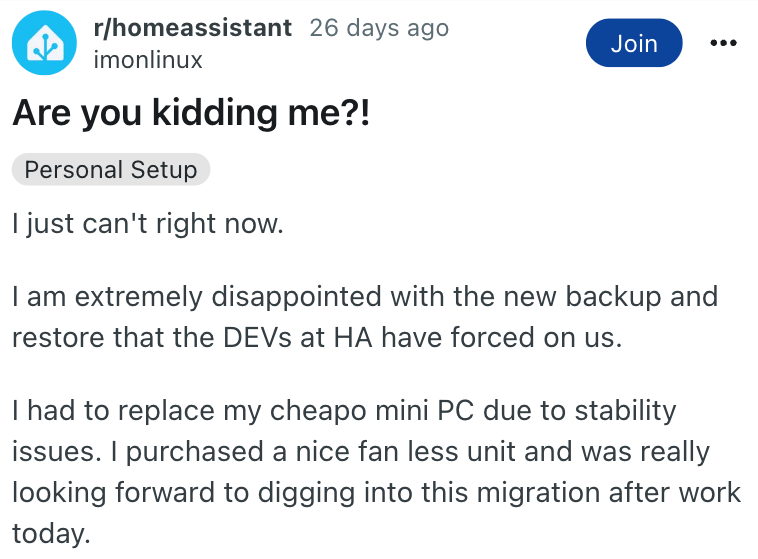
u/imonlinux was disappointed that the restore of their Home Assistant backup went incredibly smoothly, which led to their plans of a full weekend of troubleshooting being spoiled. The team sincerely apologizes for the disruption to your tinkering.
Enjoy this newsletter?
Support the Open Home Foundation, subscribe to Home Assistant Cloud
Forward to a friend, sharing is caring.
Anything else? Hit reply to send us feedback or say hello. We read everything!
|










